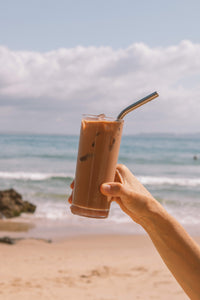tell us a bit about yourself?
I grew up as a surfer in South Australia, slowly learning more and more about how special our ocean is from a young age, and living rurally I spent a lot of time with animals growing up. fast forward to now, and a decade of following dreams and passions around the world for marine conservation, wildlife conservation, free diving, surfing, my passion grows stronger each day.
what does Earth Day mean to you personally, and how do you think individuals can make a meaningful impact on this day?
I believe every day is Earth Day, and to me, I treat it the same as in so many parts of our day to day lives we can have a huge collaborative impact. having a specific day for Earth Day is a great way to set an example for those who might be inspired to adapt more of their lives to be earth-friendly. swapping our commercially caught fish, or meat/ dairy for plant based options. Cutting some line or hooks off the reef at your local snorkel site. volunteering at an animal shelter or donating towards a wildlife rescue project, are some of the ways I love to see people doing their part.
can you share the story behind the founding of the Balu Blue Foundation? what inspired you to start this organisation?
after volunteering across a number of charitable environment projects in my early twenties, I saw some gaps, and some opportunities to use my audience to raise awareness and drive change to things that I felt really mattered. around the same time, I tragically lost my border collie Balu, to 1080 poison, a horrific but common poison used in Australia, and decided to name my organisation Balu Blue, in memory of him, and his love for wild places like our beautiful blue seas. I also was raising a kangaroo joey at the time, called Bunji ( which I went on to write a book about, called Saving Bunji ).
I wanted Balu Blue to be a new force in conservation, awareness and action in the wildlife space, sharing new age ideas, supporting real projects and real people doing amazing things, and how often our own lives day to day have the biggest impacts on our seas, and environments in Australia. we are all a part of the solution.
looking ahead, what are your hopes and aspirations for the Balu Blue Foundation and its impact on environmental conservation and ocean protection?
we have 3 main pillars. rehabilitation, education, and preservation.
we aim to focus on short-term immediate action by enabling our own care for injured wildlife, marine and land based, while funding and connecting wildlife carers across Australia.
we know that education is key to creating lasting change, and strive to foster a community of responsible environmental stewards that can spread our messages, courses, and campaigns far and wide. some examples are our messages for clear tides, surrounding marine plastics, and joining forces with other NFP’s for greater impacts on issues such as cetaceans in captivity, and banning shark nets.
for long term impact we have a vision to acquire “sanctuary pockets" with significant ecological value, including coastlines, to preserve habitat and be a safe haven for rehabilitation programs.
what are your top recommendations for living more in tune with the environment around us?
I think that people naturally want to protect the environment more when they get to experience it. that's one of the reasons why I started hosting my own wildlife expeditions, for example to Tonga. not many people get out of the water with a humpback whale, and go home not wanting to protect whales. I always tell everyone I can go on any trip, book the ticket for your dream wildlife trip, or ocean journey, you come back with a huge passion and ready to spread good messages.
the power is within connection to nature, and realising how beautiful it is, many don’t get to experience that and that is where I always try to share my experiences to inspire others to do better for our oceans, and planet.
cutting out animal products is my number 1 step to take to help both land and sea environments. the severe impacts and pressure on our landscapes, and the animals both bred, and native that fall victim to colonial style farming, and commercial fishing practices is devastating, by keeping animals of your plate, you are taking a huge step to protecting our wild places, even if its a slow transition, it is always rewarded. I personally feel that because of how I choose to live my life, and my love for animals, nature does give it back to me with incredible, sometimes indescribable experiences from wildlife, all over the world. It is truly rewarding.
can you share some of your wellness rituals that help you stay connected with nature?
freediving and surfing. I don’t go more than a day without doing one or the other, and if I can’t, ill at least go for a walk, or a swim. being in the ocean for me, is what keeps me driven, and level headed despite what I see and hear as a part of my work. it is my happy place!
spending time with my dogs, cat and my partner Chippa in nature or the ocean, or camping, is my favourite place to be!















1 comment
I have just finished reading your book SAVING BUNJI – inspiring. I saved a joey on a mine site, he was collected from the site the next day by a wildlife carer – thank goodness for wildlife carers. I live Townsville not sure I can help, but do what I can. I also rescued a turtle not so long ago, she could not dive, JCU got involved and saved her and released her back in to the wild by Magnetic Island. Let me know when your app is up and running.
Leave a comment